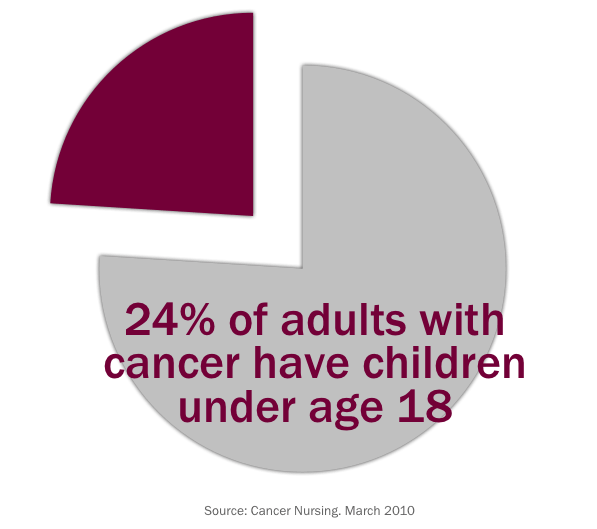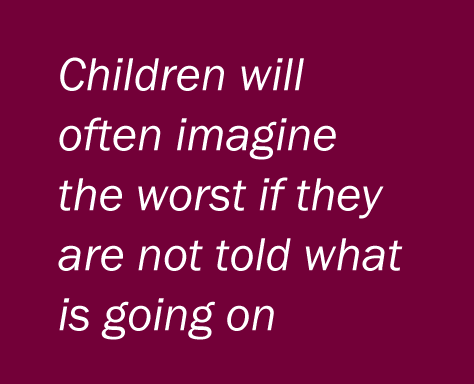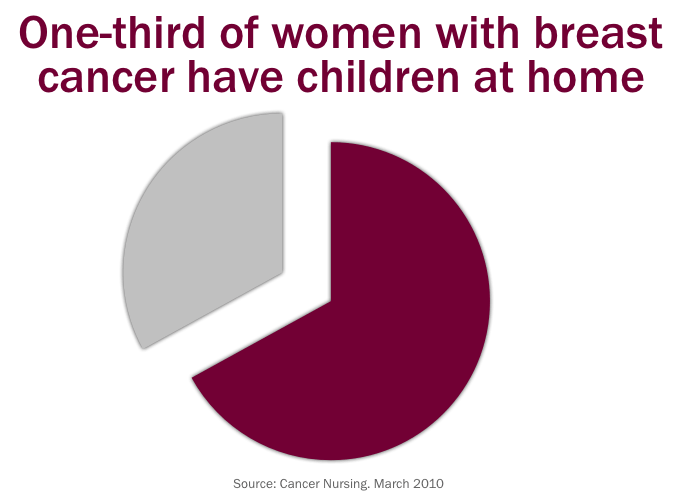It's understandably one of the hardest things a cancer patient has to do: Tell their children that dad or mom is sick. The news and subsequent health battles will be one of those experiences that shapes a child's life.
A huge chunk of people who are fighting cancer are also active parents.
 24% of adults with cancer have children under the age of 18, according to research cited in a March 2010 article of the journal Cancer Nursing.
24% of adults with cancer have children under the age of 18, according to research cited in a March 2010 article of the journal Cancer Nursing.
Because cancer treatment touches the entire family, it's important to inspire your children to roll up their sleeves and get ready.
Here are four ways to talk to your children about cancer:
1) Be open and honest.
You don't want your children to hear from someone else that you have cancer. There's no easy way or right time to give them this news, so don't wait too long.
Tell them yourself, as soon as you are confident enough to clearly convey what's going on. Consider rehearsing what you'll say with your spouse or a close friend.
 Children will often imagine the worst if they are not told what is going on, warns the American Cancer Society.
Children will often imagine the worst if they are not told what is going on, warns the American Cancer Society.
Ask your doctor to refer you to another patient who has survived your type of cancer. That person may be willing to talk to your children with you and offer the perspective of someone who's gone through it and overcome it.
Then, create a comfortable environment for your children to ask questions. No TV on in the background. All cell phones off.
Here are the main points a parent should convey, according to the American Cancer Society:
- Tell your children what kind of cancer you have. This includes which body part is affected and what stage it's at
- Explain what the doctors will do to treat it, and how that treatment might affect you
- Inform the kids that cancer can happen to anyone, and it's not their fault
- Explain that cancer isn't contagious like the flu
Then, let your children express their gut reactions.
2) Offer reassurance.
Your children may start blaming themselves or imaging the worst. Comfort them. Tell them cancer is a common illness that affects millions. Above all, stress the fact that many people go on to live perfectly normal lives after treatment.
Kids may hear a lot of things about cancer on TV, on the internet, or from friends at school. Tell your kids to make a list of everything they're hearing—good and bad. Then, help them separate the true from the false.
As you go through treatment, look for signs of how your children are coping. Consider counseling if anxiety starts to affect their physical health, social behavior or school performance.
 One-third of women with breast cancer have children at home, according to research from the March 2010 of the journal Cancer Nursing.
One-third of women with breast cancer have children at home, according to research from the March 2010 of the journal Cancer Nursing.
Common signs that children aren't coping well, according to the American Cancer Society:
- Extended periods of sadness
- Lack of concentration, reflected in their grades
- Personality changes, such as the child isolates him or herself, loses energy or shows limited interest
- Difficulty sleeping
3) Hope for the best, but prepare for the worst.
Survival rates depend on your type and stage of cancer. If the outlook isn't as positive as you'd like, make sure your children are not caught off guard if your health takes a turn for the worst.
Even if your doctors predict that you'll beat cancer, prep your children for what they can expect to see as you go through treatment. If chemotherapy is part of your treatment plan, explain to them what the side effects could be, mainly fatigue and hair loss.
4) Take a team approach.
After you've talked with your children about your diagnosis and addressed initial questions, involve them in your treatment. Give them age-appropriate responsibilities based on their interests and strengths.
If your daughter is a social media junkie, ask her to create a Facebook page to update extended family and friends on your treatment. If your son is an athlete, work with him as your personal trainer and develop a light workout plan to keep your energy up during treatment. Smaller children can do science projects, school assignments or family scrapbooks about your journey through cancer treatment.
The goal: Give your children a sense of control and purpose.
Perhaps the most important factor is open communication. Keep your kids informed about your treatment and, most importantly, let them know that you'll all get through it no matter what.
$webqFacilityNumber
Need a Physician?